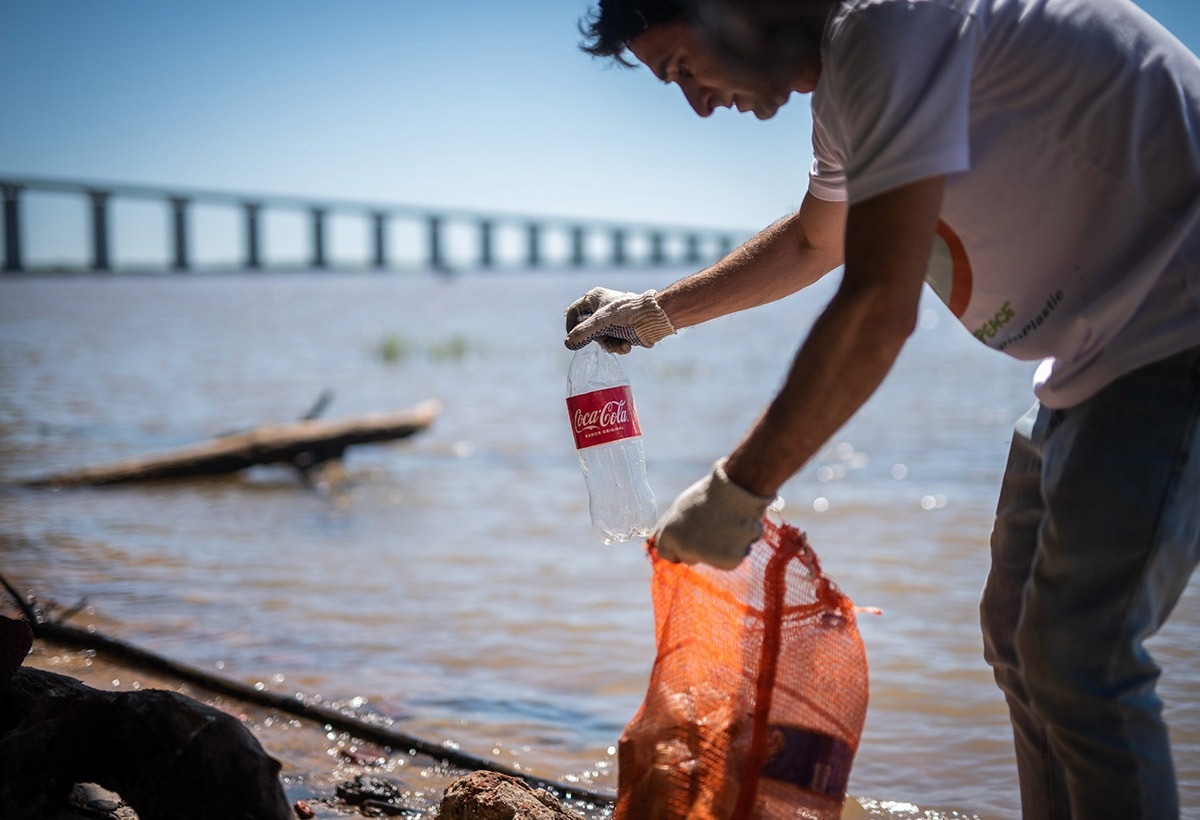A study published in Science Advances has revealed a direct link between plastic production by consumer goods companies and plastic pollution in the environment, with each 1 % increase in production corresponding to a 1 % rise in pollution. The study was led by researchers from various global universities.
 A volunteer with the Más Río Menos Basura collective finds a Coca-Cola bottle during a brand audit in Argentina in November 2023. Image Credit: Eduardo Bodiño, Más Río Menos Basura, 2023
A volunteer with the Más Río Menos Basura collective finds a Coca-Cola bottle during a brand audit in Argentina in November 2023. Image Credit: Eduardo Bodiño, Más Río Menos Basura, 2023
The study has found that fast-moving consumer goods companies have disproportionately contributed to the problem more than household and retail companies. The study marks the first robust quantification of the global relationship between plastic production and pollution.
Led by scientists from universities across the United States, Australia, the Philippines, New Zealand, Estonia, Chile, Sweden, Canada, and the United Kingdom, the research found that 56 global companies are accountable for more than half of all branded plastic pollution.
The Coca-Cola Company leads this group, responsible for 11 % of the branded waste. It is followed by PepsiCo at 5 % and Nestlé and Danone, each at 3 %. Altria/Philip Morris International accounts for 2 %. These top companies primarily operate in the food, beverage, and tobacco sectors.
The analysis spanned five years and utilized data from #BreakFreeFromPlastic brand audits, which involved 1,576 events across 84 countries. These brand audits are citizen science initiatives where volunteers conduct waste clean-ups and document the brands on the collected pollution. Throughout the duration of the study, over 200,000 volunteers contributed data via the Break Free From Plastic and the 5 Gyres’ TrashBlitz app.
The strong link between plastic production by consumer goods companies and global pollution persists across diverse geographies and waste management systems. This suggests that reducing plastic production in the fast-moving consumer goods sector could significantly curb plastic pollution.
As world leaders gather to negotiate the Global Plastics Treaty at INC-4 this month in Ottawa, Canada, this research can inform the discussions. It supports the call for a high-ambition, legally binding treaty that includes corporate accountability, prioritizes reducing plastic production, and promotes reuse and refill systems.
Co-Author Quotes:
When I first saw the relationship between production and pollution, I was shocked. I wanted to throw up, it was the reality of my worst nightmare. It means that producers big and small are toeing the line, despite all the things big brands say they are doing, we see no positive impact from their efforts. But on the other hand, it gives me hope that fast-moving consumer goods companies reducing their plastic production and shifting towards more durable and reusable products would have a strong positive impact on the environment.
Win Cowger, Research Director, The Moore Institute for Plastic Pollution Research
Dr. Lisa Erdle, Director of Science & Innovation at The 5 Gyres Institute, adds, “Our study underscores the critical role of corporate accountability in tackling plastic pollution. We, as individuals, are not responsible for the plastics crisis; the onus lies on these 56 global companies to take decisive action. I urge world leaders at INC-4 to listen to the science, and to consider the clear link between plastic production and pollution during negotiations for a Global Plastics Treaty.”
Sybil Bullock, Associate Campaign Manager at the Break Free From Plastic, notes, “This scientific study affirms what activists and communities impacted by plastic pollution have been saying for years: the more plastic is produced, the more plastic is found in the environment. It’s that simple. Yet again, plastic polluters like The Coca-Cola Company, PepsiCo, and Nestlé continue to fail on their voluntary commitment to reduce their plastic footprint. We need a legally binding Global Plastics Treaty that mandates significant cuts in plastic production and stops corporations from flooding the planet with single-use plastic.”
The research identifies the top 56 multinational companies contributing to global branded plastic litter. Past studies have ranked countries like the Philippines, Indonesia, Sri Lanka, Bangladesh, Nigeria, etc. among the top sources of plastic waste into the ocean. This has led to a narrative in social media that blames poor countries for global plastic pollution, ignoring the fact that around the 1960s global companies flooded developing countries with cheap, single-use plastics displacing traditional biodegradable materials and sustainable reuse-refill systems which, in the case of the Philippines, dated back to the 16th century. The current study focuses instead on the role of corporations and global plastic production.
Dr. Jorge Emmanuel, Adjunct Professor and Research Faculty Fellow, Institute of Environmental & Marine Sciences, and College of Engineering & Design, Silliman University
“This research provides the first quantification of global producer contribution to branded plastic pollution. The findings suggest that single-use packaging significantly contributes to branded plastic pollution. This data can help inform ways to address plastic production and reduce plastic waste ending up in the environment,” added Dr. Kathy Willis, Postdoctoral Fellow from CSIRO, Australia’s National Science Agency.
Journal Reference:
Cowger, W., et al. (2024) Global producer responsibility for plastic pollution. Science Advances. doi.org/10.1126/sciadv.adj8275.
Source: https://www.breakfreefromplastic.org/